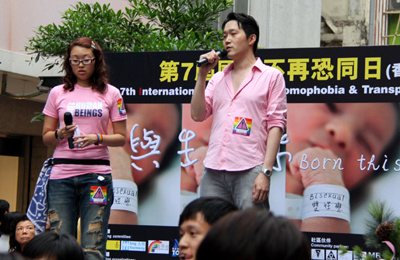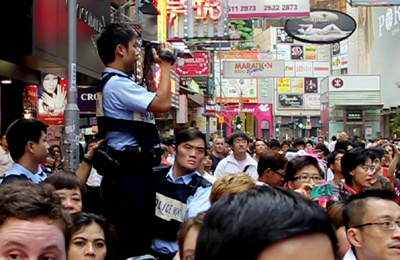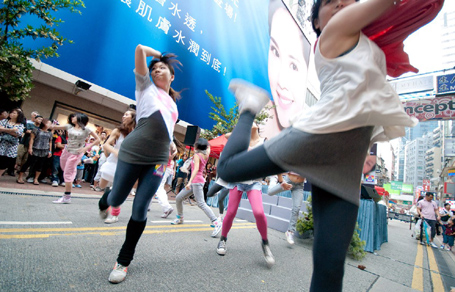On the afternoon of Sunday, May 15, a dance performance at the seventh annual International Day Against Homophobia and Transphobia (IDAHO) rally in the busy commercial district of Causeway Bay came to an end midway after organisers were told by the police that they did not have the required license.
Over a hundred supporters dressed in pink – this year’s colour theme – and many more onlookers were gathered for the event. The theme of this year’s rally was ‘Born This Way’, with the aim of promoting equal rights for all, disregarding sexual orientation or gender identity.
The event opened with speeches from LGBT activists and some Hong Kong luminaries, including legislator Cyd Ho Sau-Lan and Hong Kong Equal Opportunities Commission’s (EOC) Chairperson Lam Woon-Kwong.
“I am wearing black, not pink today, to reflect my sadness in the face of the inequalities faced by LGBT people in Hong Kong,” said Ho, founder of the political party Civic Act-up.
“The EOC may not have much statutory power, but we pledge to fight for an anti-discrimination bill for LGBT persons,” said Lam, a long-term supporter of LGBT rights.
The speeches were followed by a dance performance by Dancing Angels, who commenced their act twirling and waving to "All Because of You" a Canto-pop hit by Cass Pang.

Above, right: Chairman of the IDAHO Organizing Committee Reggie Ho.
Top of page: Performance by Dancing Angels that was stopped by the police.
The performance was suddenly cut short when the Chairman of the IDAHO Organizing Committee, Reggie Ho, stepped forward to announce: “The police have requested us to stop the performance as we do not have an entertainment licence.” The crowd booed.
“We are going to respect their decision, as Hong Kong is the land of the rule of law,” said Reggie Ho. “However, we want you (the police) to know that what we are doing here is to fight for equal rights for all, including your rights.”
The police said that the group did not have a ‘Temporary Places of Public Entertainment Licence’, and that therefore the dance performance was not allowed.
Ho told Fridae that the police had in fact watched a rehearsal of the dance performance right before the event started, and did not mention that the organisers were not in possession of a valid license to stage the show.
As a result of the interference, the programme of the event was dramatically cut short, with the 20-minute art performance cut down to less than five minutes. A 10-minute sing-along was also scrapped. The remaining activities, including the taking of photos of couples and the tying of pink ribbons to a symbolic ‘wishing tree’ went ahead as planned.

Police video-recorded the proceedings on the stage before the dance
performances began. The video recording equipment was withdrawn
after the dancing stopped.
The rally had, from the start, met with a heavy police presence and the police video-recorded the proceedings on the stage before the dance performances began. The video recording equipment was withdrawn after the dancing stopped, though six to seven police officers remained at the site.
“This is over-policing. Your presence is an act of intimidation, and violates our right to freedom of speech. Please withdraw,” argued solicitor Michael Vidler. This was to no avail.
“It is strange that the police should prohibit LGBT people from expressing themselves through dance. This has not happened with other events I know of, such as gatherings promoting racial tolerance, in which ethnic dances were performed. I think this is an infringement on our freedom of speech. We shall certainly look into this incident,” commented Madeleine Mok of Amnesty International, one of the organisers.
Her comment was correct; all LGBT public events held so far in Hong Kong have included some form of celebratory performances, and none have so far been similarly banned. In fact, Amnesty International Hong Kong had a rally in Kowloon at the same time, which included music and dancing but did not require a license.
Ho acknowledged in an interview with Fridae that when organisers were applying a "notice of no objection" for the rally, the police told the organisers they "might" need a performance license.
“But we felt that it was more for events of much larger scales and actual entertainment purposes, not for a 20-minute segment of dancing to convey an anti-discrimination message. That view has been echoed in the press by legislators James To and Cyd Ho. And because there were rallies with music and dance before without such a license and there were never any problems, we went ahead without. It was only when the police turned up with camera during the event that they told us that they were acting on Chapter 172 Places of Public Entertainment Ordinance.”
Despite the police interference, attendees thought that the rally had achieved its aims. “I saw many pedestrians stopping by to see what this was about. I think that will help to spread the message of equality to the wider public,” said Brian, an attendee.
One participant even thought that the police interference was helpful to the cause: “This act of suppression only helps to bring people together. This event has really helped to build a bridge of communication and cooperation between different LGBT groups in Hong Kong,” said Anshuman Das.
The seventh IDAHO rally was organised by the following groups and organisations: Amnesty International Hong Kong, Gay Harmony, Rainbow of Hong Kong, Tongzhi Community Joint Meeting, and Transgender Resource Centre.

